-
 Bitcoin
Bitcoin $83,733.4061
-1.29% -
 Ethereum
Ethereum $1,594.3479
-1.74% -
 Tether USDt
Tether USDt $1.0000
0.01% -
 XRP
XRP $2.0826
-1.94% -
 BNB
BNB $581.9915
-0.41% -
 Solana
Solana $126.1154
-2.12% -
 USDC
USDC $0.9999
-0.01% -
 TRON
TRON $0.2513
0.07% -
 Dogecoin
Dogecoin $0.1553
-2.14% -
 Cardano
Cardano $0.6128
-3.26% -
 UNUS SED LEO
UNUS SED LEO $9.3174
-1.22% -
 Chainlink
Chainlink $12.3521
-1.81% -
 Avalanche
Avalanche $18.8671
-5.22% -
 Stellar
Stellar $0.2363
-1.27% -
 Toncoin
Toncoin $2.9018
0.31% -
 Shiba Inu
Shiba Inu $0.0...01172
-0.86% -
 Sui
Sui $2.0951
-3.63% -
 Hedera
Hedera $0.1580
-4.98% -
 Bitcoin Cash
Bitcoin Cash $319.4231
-0.81% -
 Litecoin
Litecoin $76.0657
-1.99% -
 Polkadot
Polkadot $3.5459
-2.73% -
 Dai
Dai $1.0000
0.01% -
 Bitget Token
Bitget Token $4.2560
-1.12% -
 Hyperliquid
Hyperliquid $15.2255
-5.33% -
 Ethena USDe
Ethena USDe $0.9992
0.01% -
 Pi
Pi $0.6236
-15.50% -
 Monero
Monero $216.8844
2.23% -
 Uniswap
Uniswap $5.2307
-1.66% -
 OKB
OKB $52.1135
1.06% -
 Pepe
Pepe $0.0...07120
-2.00%
How to prevent mining machines from being hacked?
Secure mining machines with VPNs, firewalls, strong passwords, regular updates, and vigilant monitoring to prevent hacking and protect your cryptocurrency operations.
Apr 08, 2025 at 09:00 pm
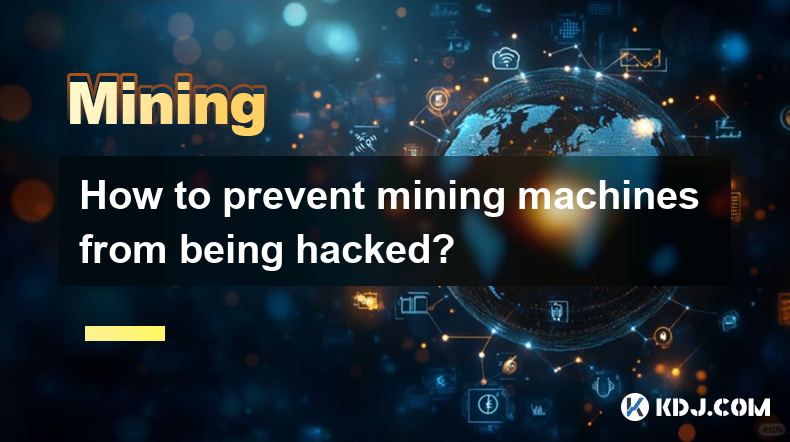
In the world of cryptocurrency, mining machines play a crucial role in securing networks and validating transactions. However, these machines are also prime targets for hackers looking to exploit vulnerabilities for financial gain. Preventing mining machines from being hacked requires a multi-faceted approach that includes robust security measures, regular updates, and vigilant monitoring. This article will guide you through the essential steps to safeguard your mining operations.
Understanding the Risks
Before diving into prevention strategies, it's important to understand the common risks associated with mining machines. Hackers often target these devices to steal cryptocurrency, hijack computing power for their own mining operations, or even to launch broader attacks on the network. Common vulnerabilities include outdated software, weak passwords, and unsecured network connections. By recognizing these risks, you can better prepare to mitigate them.
Securing Your Network
The first line of defense in protecting your mining machines is securing your network. A strong network security setup is essential to prevent unauthorized access. Here are the steps you should take:
- Use a VPN: A Virtual Private Network (VPN) can encrypt your internet connection, making it harder for hackers to intercept your data. Choose a reputable VPN service and ensure it is always active when your mining machines are online.
- Implement a Firewall: A firewall can block unauthorized access to your network. Configure your firewall to allow only necessary traffic and regularly update its rules to address new threats.
- Segment Your Network: Isolate your mining machines on a separate network segment. This can limit the spread of an attack if one machine is compromised, protecting the rest of your network.
Strengthening Machine Security
Once your network is secure, focus on strengthening the security of the mining machines themselves. Each machine should be fortified to withstand potential attacks. Here's how:
- Update Firmware and Software: Regularly check for and install updates for your mining machine's firmware and any software it runs. Manufacturers often release patches for known vulnerabilities, so staying up-to-date is crucial.
- Use Strong Passwords: Use complex, unique passwords for each mining machine and change them regularly. Avoid using easily guessable passwords and consider using a password manager to generate and store secure passwords.
- Enable Two-Factor Authentication (2FA): Whenever possible, enable 2FA on your mining machines. This adds an extra layer of security by requiring a second form of verification, such as a text message or an authentication app, to access the machine.
Monitoring and Detection
Even with robust security measures in place, it's important to monitor your mining machines for any signs of intrusion. Continuous monitoring can help you detect and respond to threats quickly. Consider the following:
- Install Security Software: Use antivirus and anti-malware software specifically designed for mining machines. These tools can detect and remove malicious software that might be used to compromise your machines.
- Set Up Alerts: Configure your monitoring systems to send alerts for unusual activity, such as unexpected login attempts or changes in mining performance. This can help you respond to potential threats before they escalate.
- Regular Audits: Conduct regular security audits of your mining machines and network. Look for any signs of unauthorized access or suspicious activity and take corrective action as needed.
Physical Security Measures
While much of the focus is on digital security, physical security is equally important. Mining machines are valuable assets, and physical access to them can lead to theft or tampering. Here are some measures to consider:
- Secure the Location: Keep your mining machines in a secure, locked facility. Limit access to authorized personnel only and use surveillance cameras to monitor the area.
- Use Tamper-Evident Seals: Apply tamper-evident seals to your mining machines. These seals can alert you if someone has attempted to open or tamper with the hardware.
- Backup and Recovery: Regularly back up your mining machine configurations and data. In the event of a physical attack, having backups can help you quickly restore your operations.
Educating Your Team
Finally, educating your team about security best practices is crucial. Your employees or partners who manage the mining machines should be aware of the risks and know how to respond to potential threats. Here are some tips for effective education:
- Regular Training: Conduct regular training sessions on cybersecurity best practices. Cover topics such as password management, recognizing phishing attempts, and the importance of software updates.
- Create a Security Policy: Develop a comprehensive security policy that outlines the procedures for securing and monitoring mining machines. Ensure that all team members understand and follow this policy.
- Encourage Reporting: Foster a culture where team members feel comfortable reporting any suspicious activity or security concerns. Quick reporting can help mitigate potential threats before they cause significant damage.
Frequently Asked Questions
Q: Can mining machines be hacked remotely?
A: Yes, mining machines can be hacked remotely if they are connected to the internet and have vulnerabilities that hackers can exploit. Using a VPN, implementing a firewall, and keeping software up-to-date can help prevent remote hacking attempts.
Q: How often should I update the firmware on my mining machines?
A: It's recommended to check for firmware updates at least once a month. However, if a critical security patch is released, you should update your machines as soon as possible to protect against known vulnerabilities.
Q: What should I do if I suspect my mining machine has been hacked?
A: If you suspect your mining machine has been hacked, immediately disconnect it from the internet to prevent further damage. Then, run a full scan with your security software, change all passwords, and consider restoring from a recent backup if necessary. It's also wise to consult with a cybersecurity professional to assess and address the breach.
Q: Are there any specific antivirus programs recommended for mining machines?
A: While there isn't a one-size-fits-all solution, some antivirus programs that are popular among miners include Malwarebytes, Bitdefender, and Kaspersky. Choose a program that is known for its effectiveness against mining-specific threats and ensure it is compatible with your mining software.
Disclaimer:info@kdj.com
The information provided is not trading advice. kdj.com does not assume any responsibility for any investments made based on the information provided in this article. Cryptocurrencies are highly volatile and it is highly recommended that you invest with caution after thorough research!
If you believe that the content used on this website infringes your copyright, please contact us immediately (info@kdj.com) and we will delete it promptly.
- Synthetic Stablecoin Issuer Ethena Labs Shuts Down Operations in Germany
- 2025-04-16 10:15:20
- Make no mistake – Pulsz slots are top-notch
- 2025-04-16 10:15:20
- Pre-draft, Paige Bueckers Dazzled in a Brown Crystal-embellished Power Suit
- 2025-04-16 10:10:13
- As Q2 begins, crypto markets are showing signs of renewed optimism — and with it, fresh opportunities for strategic investment.
- 2025-04-16 10:10:13
- Top 3 Cryptocurrencies to Buy Right Now (April 15th)
- 2025-04-16 10:05:12
- Ethereum (ETH) Shows Early Signs of Recovery as Whales Accumulate
- 2025-04-16 10:05:12
Related knowledge

How to reduce the electricity cost of mining?
Apr 16,2025 at 08:42am
Mining cryptocurrencies, particularly Bitcoin, is an energy-intensive process that can lead to significant electricity costs. However, there are several strategies that miners can employ to reduce these expenses and make their operations more cost-effective. In this article, we will explore various methods to minimize the electricity cost of mining. Cho...
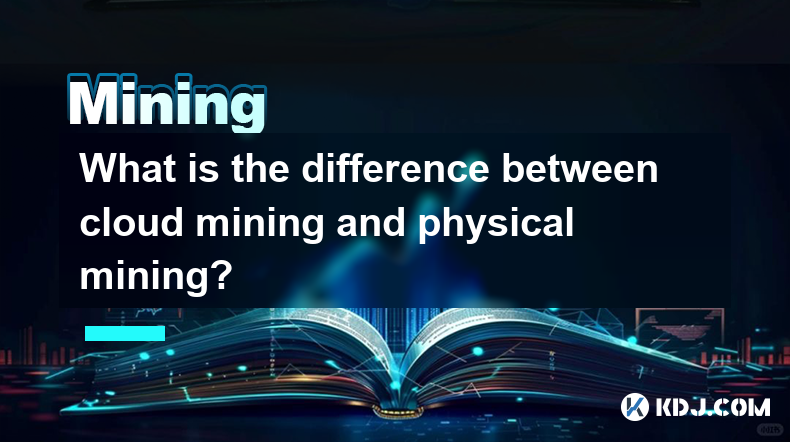
What is the difference between cloud mining and physical mining?
Apr 16,2025 at 01:49am
What is the difference between cloud mining and physical mining? In the world of cryptocurrencies, mining is the process by which new coins are generated and transactions are verified and added to the blockchain. There are two primary methods of mining: cloud mining and physical mining. Understanding the differences between these two approaches can help...
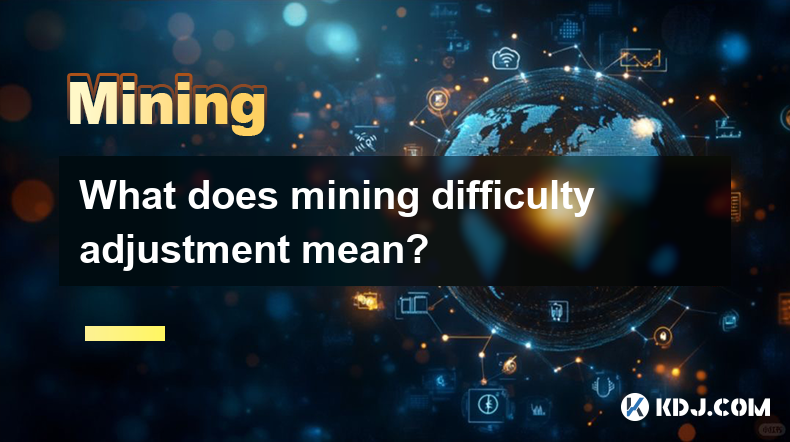
What does mining difficulty adjustment mean?
Apr 16,2025 at 12:42am
What does mining difficulty adjustment mean? Mining difficulty adjustment is a crucial mechanism in blockchain networks, particularly in Proof of Work (PoW) systems like Bitcoin. It ensures that the rate at which new blocks are added to the blockchain remains consistent, despite fluctuations in the total computational power (hash rate) of the network. T...

How to choose a suitable cryptocurrency for mining?
Apr 16,2025 at 10:15am
Choosing a suitable cryptocurrency for mining involves several considerations that can impact your profitability and efficiency. Mining cryptocurrencies can be a rewarding venture, but it requires careful planning and research. In this article, we will explore the key factors to consider when selecting a cryptocurrency for mining, ensuring you make an i...
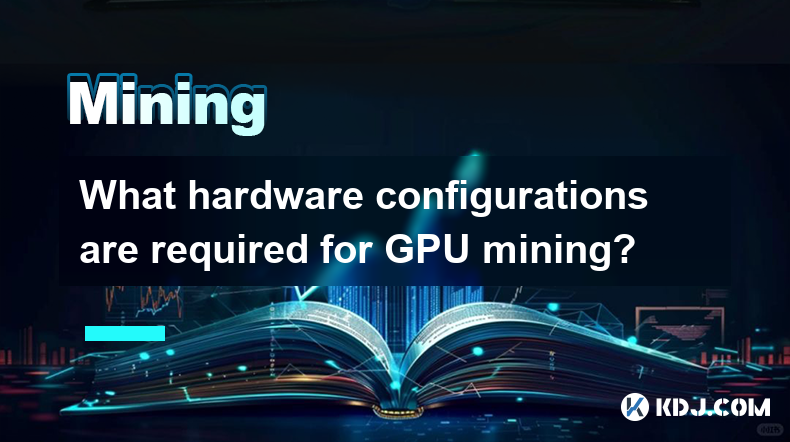
What hardware configurations are required for GPU mining?
Apr 16,2025 at 09:21am
GPU mining has become a popular method for cryptocurrency enthusiasts to mine various cryptocurrencies, such as Ethereum, Ravencoin, and others. To successfully engage in GPU mining, it is essential to understand the hardware configurations required to maximize efficiency and profitability. This article will delve into the specifics of what you need to ...
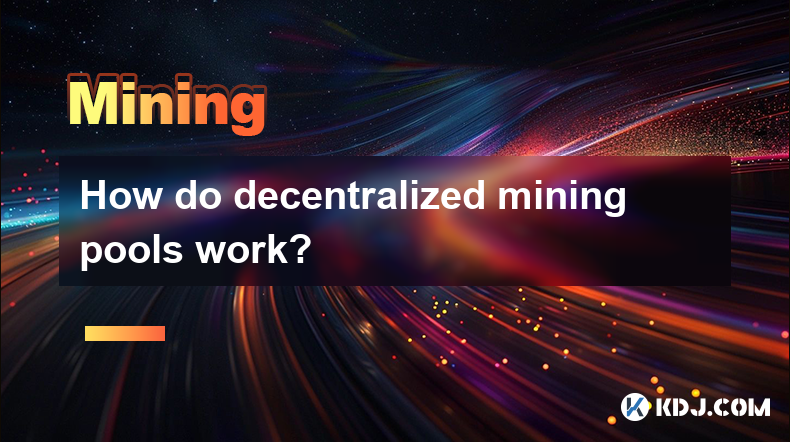
How do decentralized mining pools work?
Apr 16,2025 at 05:42am
Decentralized mining pools represent a significant evolution in the world of cryptocurrency mining, offering a more democratic and transparent approach compared to traditional centralized pools. In this article, we will explore the mechanics of decentralized mining pools, their benefits, and how they operate within the cryptocurrency ecosystem. What are...

How to reduce the electricity cost of mining?
Apr 16,2025 at 08:42am
Mining cryptocurrencies, particularly Bitcoin, is an energy-intensive process that can lead to significant electricity costs. However, there are several strategies that miners can employ to reduce these expenses and make their operations more cost-effective. In this article, we will explore various methods to minimize the electricity cost of mining. Cho...

What is the difference between cloud mining and physical mining?
Apr 16,2025 at 01:49am
What is the difference between cloud mining and physical mining? In the world of cryptocurrencies, mining is the process by which new coins are generated and transactions are verified and added to the blockchain. There are two primary methods of mining: cloud mining and physical mining. Understanding the differences between these two approaches can help...

What does mining difficulty adjustment mean?
Apr 16,2025 at 12:42am
What does mining difficulty adjustment mean? Mining difficulty adjustment is a crucial mechanism in blockchain networks, particularly in Proof of Work (PoW) systems like Bitcoin. It ensures that the rate at which new blocks are added to the blockchain remains consistent, despite fluctuations in the total computational power (hash rate) of the network. T...

How to choose a suitable cryptocurrency for mining?
Apr 16,2025 at 10:15am
Choosing a suitable cryptocurrency for mining involves several considerations that can impact your profitability and efficiency. Mining cryptocurrencies can be a rewarding venture, but it requires careful planning and research. In this article, we will explore the key factors to consider when selecting a cryptocurrency for mining, ensuring you make an i...

What hardware configurations are required for GPU mining?
Apr 16,2025 at 09:21am
GPU mining has become a popular method for cryptocurrency enthusiasts to mine various cryptocurrencies, such as Ethereum, Ravencoin, and others. To successfully engage in GPU mining, it is essential to understand the hardware configurations required to maximize efficiency and profitability. This article will delve into the specifics of what you need to ...

How do decentralized mining pools work?
Apr 16,2025 at 05:42am
Decentralized mining pools represent a significant evolution in the world of cryptocurrency mining, offering a more democratic and transparent approach compared to traditional centralized pools. In this article, we will explore the mechanics of decentralized mining pools, their benefits, and how they operate within the cryptocurrency ecosystem. What are...
See all articles























































































